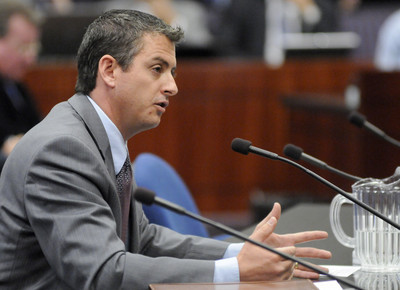Schools funding cut OK’d

CARSON CITY — Lawmakers approved the equivalent of a 4 percent cut in teacher salaries and a mandatory furlough of one day per month for other state employees Monday as they struggled to formulate a state budget amid historic revenue shortfalls.
The $193 million cut in state funding to school districts equates to a 4 percent cut in salaries for teachers and other district employees, but it is up to the districts to implement.
The cut was less severe than the 6 percent reduction proposed by Gov. Jim Gibbons in January. Lawmakers said the 4 percent proposal would keep education funding just above the threshold the state must meet to get more than $300 million in federal stimulus funding.
Members of the state Assembly Ways and Means and Senate Finance committees also voted to suspend merit and longevity raises for non-education state employees, as Gibbons had proposed, but refused most of the cuts the governor had recommended to employees’ health benefits.
By taking 12 days a year off without pay, furloughed employees would see a drop in their pay of 4.6 percent, but lawmakers said that because their benefits would remain at the level of their regular salary, the total cut would amount to about 4 percent.
"I think it’s fair to say none of the legislators would have liked to cut any of these funds, but unfortunately, our revenue is 44 percent below what is needed to fund current services," Assembly Speaker Barbara Buckley, D-Las Vegas, said in the committee hearing.
"With the level of shortfall we have, we are going to be forced to make cuts that we would like not to make, but we don’t really have much of a choice."
The salaries represented the first major area of the budget on which lawmakers have reached agreement as the legislative session enters its final month. The mostly unanimous votes on the reductions, across party lines, came after hours of closed-door meetings of leading lawmakers throughout the day.
Senate Majority Leader Steven Horsford, D-Las Vegas, said cutting pay was preferable to cutting jobs in the current economic climate.
"This allows them to preserve their livelihoods and the livelihoods of their families, which is an important consideration," he said. "It also shows the shared responsibility all Nevadans are going to have to take in order to balance this budget in a way that protects education in particular."
Lawmakers did not reveal how they plan to pay for the spending they are adding back to the budget. Even with the larger cuts proposed by Gibbons, the budget would cost $900 million more than the state is projected to have in the next two years.
In a hearing Monday morning, legislators grilled Gibbons’ budget director, Andrew Clinger, about how the governor proposed to balance the budget, given that he has vowed not to raise additional taxes.
Clinger said that once federal stimulus money is factored in, the governor needs to make about $500 million in additional cuts.
In order not to jeopardize the stimulus money, those cuts would have to come almost entirely from areas other than K-12 and higher education.
Clinger declined to say what level of salary and other cuts the governor would be proposing, but he indicated that unpaid holidays and furloughs would be part of the equation. He said a new set of recommendations would be submitted Wednesday or Thursday.
Lawmakers expressed annoyance with the delay. Sen. Bernice Mathews, D-Reno, implied Gibbons was trying to run out the clock on the 120-day session so that the legislators will not have time to pass their preferred budget over his veto.
"That’s the whole strategy, to keep us as close to the deadline as possible," she said.
Dennis Mallory of the state employees’ union said members did not want to see their pay cut, but furloughs were preferable to being paid less for the same amount of work.
"This way, they can spend some time with their families and save on gas from their commute," he said.
If state workers are making sacrifices to help the government balance its budget, he said, private industry should be compelled to do the same through higher taxes.
"Big business had better be at the table," he said. "It better not end with our people. If they don’t come to the table, I’ll help the speaker (Buckley) take the table to them."
Contact reporter Molly Ball at mball@reviewjournal.com or 702-387-2919.